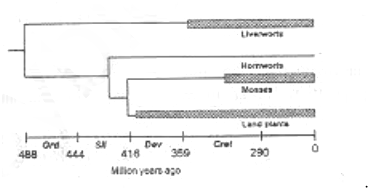 Multiple Choice Questions
Multiple Choice QuestionsThe idea that an altruistic gene will be favoured if r > C/B, where r is the coefficient of relaedness, B is the benefit to the recipient of the altruism, and C is the cost incurred to the donor, is known as
Red queen hypothesis
Handicap principle
Hamilton’s rule
Competitive exclusion principle
A paraphyletic group
Contains unrelated organisms.
Includes the most recent common ancestor but not all of its descendants.
Includes all the representatives of a clade but not the most recent common ancestor.
Contains all the representatives of a clade and the most recent common ancestor.
Among the following events in the history of life
a – prokaryotic cell
b – eukaryotic cell
c – natural selection
d – organic molecules
e – self-replicating molecules
which is the correct chronological order?
d, e, c, a, b
d, e, a, b, c
e, d, a, c, b
d, e, a, c, b
The Hardy-Weinberg principle comes from considering what happens when Mendelian genes act in a population. The model predicts that there will be no change in allele frequencies when
Migration into the population appears at a steady rate.
The population suffers a bottleneck
A rare new mutation is associated with a sharp increase in fitness.
No evolutionary process is at work.
D.
No evolutionary process is at work.
The Hardy-Weinberg principle predicts that there will be no change in allele frequencies when no evolutionary process is at work.
Which of the following is responsible for the initiation of maternal behavior in the first-time pregnant rats after parturition?
Higher prolactin levels in blood.
Stimulation of sensory receptors during delivery.
Changes of uterine volume.
Presence of male rats.
According to fossil records, the earliest fossils of liverworts are found in the late Devonian, of mosses in the early Cretaceous, and vascular plants in the last Silurian/ early Devonian. Anthoceros (hornworts) fossils have not been discovered. Reading fossil records we would say that vascular plants appeared first, then mosses and then liverworts.

However, phylogenetic relationships (shown in the figure) suggest otherwise. It may be that:
(A) evolutionary history can be read directly from the fossil record.
(B) the moss lineage goes back to at least early Silurian/ early Devonian.
(C) fossils can only set a maximum age for a lineage.
(D) fossils can only set a minimum age for a lineage.
(E) the divergence between liverworts and the rest of land plants goes back to at least the early Ordovician.
Which of the following statements is correct?
(A), (B), (C), (E)
(B), (D), (E)
(A), (B), (D), (E)
(B), (C), (E)
Northern Elephant seals had been reduced to about 20 individuals in the 1800s. Biologists studied variation in proteins in the species. They found no genetic differences in the protein among different individuals. This lack of variation is due to:
The fact that elephant seals live in a constant environment where there is no need for genetic variation.
Population bottleneck and genetic drift.
Natural selection resulting in a single best genotype.
A very low rate of mutation
Which of the following is a prediction of the neutral theory of molecular evolution that is supported by data?
Humans and chimps differ more in DNA sequences of pseudogenes than in coding regions of functional genes.
Humans and chimps differ more in DNA sequences of coding regions of functional genes than of pseudogenes.
Humans have a faster evolution of most of their DNA sequences than chimps.
The more advanced species have more number of functional genes.
In pre-industrial period in England, peppered moths had light coloration which effectively camouflaged them against light-colored trees and lichens. During industrial revolution, many lichens died out and trees became blackened by soot from factories, and interestingly, dark-colored moths were predominantly seen. This happened due to
natural selection of dark coloured moths which were initially present in fewer numbers.
new mutation which arose due to environmental pollution
macroevolution occurring due to environmental change
natural selection of the camouflaging mechanism of the moths
The speciation in which a population splits into two geographically isolated populations experience dissimilar selective pressure and genetic drift is known as
sympatric speciation
parapatric speciation
peripatric speciation
allopatric speciation
